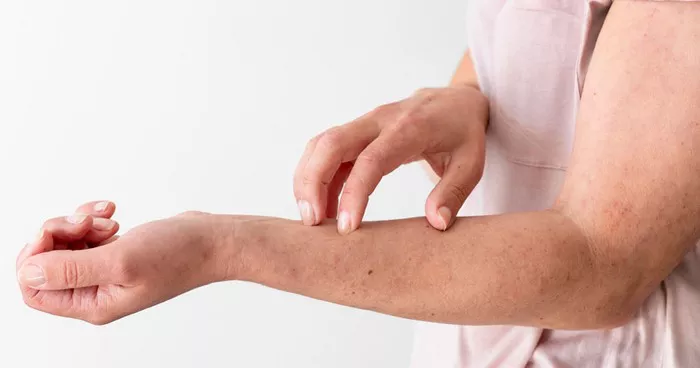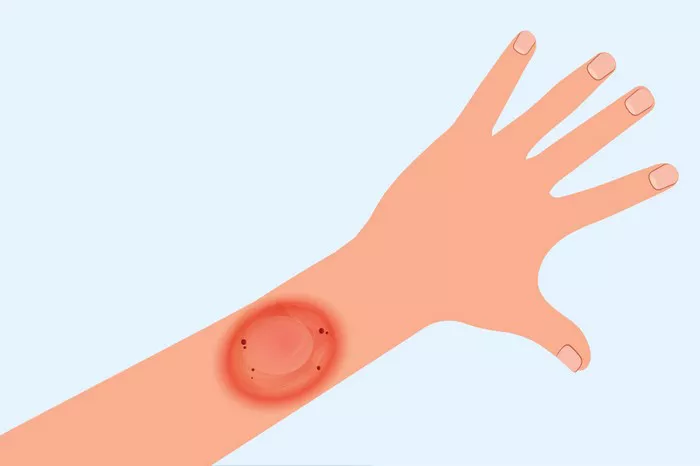Autoimmune diseases are a group of disorders where the body’s immune system mistakenly attacks its own tissues, considering them foreign invaders. Among the many manifestations of autoimmune diseases, hives—or urticaria—stand out as a common but often overlooked symptom. Understanding the relationship between autoimmune diseases and hives is crucial for effective diagnosis and treatment. This article delves into various autoimmune conditions that can cause hives, exploring the mechanisms, symptoms, and management strategies for each.
What Are Hives?
Hives, or urticaria, are raised, itchy welts on the skin that can vary in size and appear anywhere on the body. They are often red or skin-colored and can be caused by several factors, including allergic reactions, infections, and autoimmune diseases. Acute hives last less than six weeks, while chronic hives persist for longer. When linked to autoimmune diseases, hives can be particularly challenging to diagnose and treat due to the complex nature of these conditions.
The Immune System and Autoimmunity
The immune system is designed to protect the body from infections and diseases by identifying and attacking pathogens such as bacteria, viruses, and fungi. However, in autoimmune diseases, the immune system malfunctions and targets the body’s own cells and tissues. This self-attack leads to inflammation, tissue damage, and a wide range of symptoms, including hives.
Autoimmune Diseases That Can Cause Hives
1. Systemic Lupus Erythematosus (SLE)
Systemic lupus erythematosus, commonly known as lupus, is a chronic autoimmune disease that can affect various parts of the body, including the skin, joints, kidneys, and brain. Lupus is characterized by the production of autoantibodies that target and damage tissues.
Hives in Lupus:
Hives are a relatively common skin manifestation in lupus patients. They can occur due to the immune system attacking the skin or as a reaction to medications used to treat lupus. Lupus-related hives are often accompanied by other symptoms such as fatigue, joint pain, and photosensitivity.
Mechanisms:
In lupus, hives may be caused by immune complexes (clusters of antibodies and antigens) that deposit in blood vessels, leading to inflammation and swelling. Additionally, histamine release from mast cells can contribute to the development of hives.
Management:
Managing hives in lupus involves treating the underlying disease with medications such as corticosteroids, immunosuppressants, and antimalarials like hydroxychloroquine. Antihistamines and topical treatments can provide symptomatic relief for hives.
2. Dermatomyositis
Dermatomyositis is an inflammatory disease that causes muscle weakness and a distinctive skin rash. It is classified as a type of myositis and is more common in women.
Hives in Dermatomyositis:
Patients with dermatomyositis may develop hives as part of their skin symptoms. These hives can be chronic and challenging to treat.
Mechanisms:
The exact cause of hives in dermatomyositis is not well understood, but it is believed to be related to the immune system’s attack on the skin and muscles. Inflammatory cytokines and other immune mediators may play a role.
Management:
Treatment of dermatomyositis involves immunosuppressive medications, physical therapy, and skin care. For hives, antihistamines and corticosteroids may be used to reduce symptoms.
3. Hashimoto’s Thyroiditis
Hashimoto’s thyroiditis is an autoimmune disorder that affects the thyroid gland, leading to hypothyroidism (underactive thyroid). It is the most common cause of hypothyroidism in the United States.
Hives in Hashimoto’s Thyroiditis:
Chronic urticaria, or long-lasting hives, is frequently associated with Hashimoto’s thyroiditis. The link between the two conditions is well-documented but not fully understood.
Mechanisms:
It is hypothesized that the immune system’s attack on the thyroid gland may trigger a broader immune response, leading to hives. Additionally, thyroid dysfunction itself can influence skin health and immune responses.
Management:
Treating Hashimoto’s thyroiditis typically involves thyroid hormone replacement therapy to normalize thyroid levels. For hives, antihistamines and corticosteroids are commonly used. In some cases, addressing the thyroid condition can help alleviate hives.
4. Rheumatoid Arthritis
Rheumatoid arthritis (RA) is a chronic autoimmune disease that primarily affects the joints, causing pain, swelling, and stiffness. It can also have systemic effects, impacting the skin, eyes, and other organs.
Hives in Rheumatoid Arthritis:
Hives can occur in patients with RA, either as a direct result of the disease or as a reaction to medications used in treatment.
Mechanisms:
The inflammatory processes in RA, driven by cytokines and other immune mediators, can contribute to the development of hives. Medication reactions, particularly to drugs like nonsteroidal anti-inflammatory drugs (NSAIDs) and disease-modifying antirheumatic drugs (DMARDs), are also a common cause.
Management:
Management of hives in RA includes adjusting medications, using antihistamines, and applying topical treatments. Controlling the underlying RA with appropriate therapies can also help reduce the occurrence of hives.
5. Autoimmune Urticaria
Autoimmune urticaria is a specific type of chronic hives caused by the immune system attacking the body’s own tissues. It is often linked to other autoimmune diseases but can occur independently.
Hives in Autoimmune Urticaria:
Hives in autoimmune urticaria are typically chronic and recurrent, often resistant to standard antihistamine treatments.
Mechanisms:
Autoimmune urticaria is characterized by the presence of autoantibodies that activate mast cells and basophils, leading to the release of histamine and other inflammatory mediators. This results in persistent hives.
Management:
Treatment options for autoimmune urticaria include high-dose antihistamines, corticosteroids, and immunomodulatory therapies such as omalizumab (an anti-IgE antibody). Identifying and managing any associated autoimmune diseases is also crucial.
6. Celiac Disease
Celiac disease is an autoimmune disorder triggered by the ingestion of gluten, a protein found in wheat, barley, and rye. It primarily affects the small intestine but can have systemic effects.
Hives in Celiac Disease:
While the most common skin manifestation of celiac disease is dermatitis herpetiformis, some patients may also experience hives.
Mechanisms:
The immune response to gluten in celiac disease can lead to systemic inflammation and immune dysregulation, which may contribute to the development of hives.
Management:
The primary treatment for celiac disease is a strict gluten-free diet, which can reduce inflammation and immune activity. For hives, antihistamines and corticosteroids may be used for symptomatic relief.
7. Sjogren’s Syndrome
Sjogren’s syndrome is an autoimmune disease that primarily affects the glands that produce tears and saliva, leading to dry eyes and mouth. It can also affect other organs and tissues.
Hives in Sjogren’s Syndrome:
Chronic hives are a less common but possible symptom in Sjogren’s syndrome. They may be associated with other skin manifestations such as vasculitis.
Mechanisms:
The immune system’s attack on glandular and other tissues in Sjogren’s syndrome can lead to systemic inflammation and immune dysregulation, contributing to the development of hives.
Management:
Treatment of Sjogren’s syndrome involves managing dry eye and mouth symptoms, using immunosuppressive medications, and addressing any systemic involvement. For hives, antihistamines and corticosteroids are typically used.
Diagnosis and Treatment of Autoimmune-Related Hives
Diagnosing the cause of hives in patients with autoimmune diseases requires a thorough medical history, physical examination, and laboratory tests. Identifying the underlying autoimmune disease is crucial for effective management.
1. Diagnostic Steps:
- Medical History and Physical Examination: A detailed history of symptoms, medication use, and family history of autoimmune diseases is essential.
- Laboratory Tests: Blood tests to check for markers of autoimmune diseases, thyroid function tests, and tests for specific autoantibodies can help diagnose the underlying condition.
- Skin Biopsy: In some cases, a skin biopsy may be performed to examine the tissue and identify specific inflammatory patterns.
2. Treatment Strategies:
- Managing the Underlying Autoimmune Disease: Effective treatment of the autoimmune disease can often help reduce or eliminate hives. This may involve immunosuppressive medications, disease-specific treatments, and lifestyle modifications.
- Symptomatic Relief: Antihistamines are the first line of treatment for hives, helping to reduce itching and swelling. In more severe cases, corticosteroids, immunomodulatory drugs, and biologics like omalizumab may be used.
- Avoiding Triggers: Identifying and avoiding potential triggers, such as certain foods, medications, and environmental factors, can help manage hives.
- Regular Monitoring: Patients with chronic hives and autoimmune diseases should be regularly monitored by healthcare professionals to adjust treatment plans as needed and manage any new or worsening symptoms.
Conclusion
Hives can be a perplexing and distressing symptom of autoimmune diseases, but understanding their underlying mechanisms and associations is key to effective management. Systemic lupus erythematosus, dermatomyositis, Hashimoto’s thyroiditis, rheumatoid arthritis, autoimmune urticaria, celiac disease, and Sjogren’s syndrome are among the autoimmune conditions that can cause hives. Proper diagnosis and a comprehensive treatment approach, focusing on both the autoimmune disease and the hives, are essential for improving patient outcomes and quality of life.
Related Topics:

























